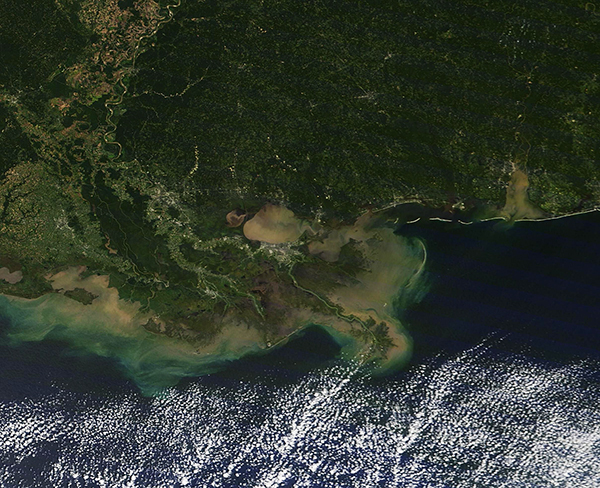Images
September 26, 2021 - Sediment Swirls in Lake Pontchartrain and the Gulf of Mexico
Tweet
Almost a month after Hurricane Ida came ashore as a strong Category 4 hurricane, the storm’s impacts are still visible in southern Louisiana. After a slow approach that churned the waters of the Gulf of Mexico and scoured the shoreline, Ida made landfall on August 29, 2021, carrying maximum sustained winds of 150 mph (240 km/h). The storm brought massive storm surge, torrential rains, and strong winds to coastal Louisiana before it slowly crawled northward on a trek that dumped extreme amounts of rainfall that swept sediment into lakes, rivers, and ultimately the Gulf of Mexico.
While recovery is well underway, significant damage remains, including vast amounts of suspended sediment that is easily seen from space. In addition, the death toll directly attributed to the storm has increased to 26, according to media reports, and thousands remain without power. On September 25, Entergy published on its website that approximately 500 of its customers that are able to safely receive power are waiting for restoration, but several thousands of customers region remain unable to take power. Among these are about 3,700 customers in Lafourche Parish and 3,000 in Jefferson Parish.
On September 25, the Moderate Resolution Imaging Spectroradiometer (MODIS) on board NASA’s Terra satellite acquired a true-color image of sediment-stained waters that remain after Hurricane Ida. Just north of the city of New Orleans, Lake Pontchartrain is filled with muddy swirls, as is nearby Lake Maurepas (west) and Lake Borgne (east). Mud-colored tan sediment hugs the entire coastline of Louisiana as well as parts of Mississippi. Further from shore, sediment creates a halo of green as it sinks deeper into the Gulf water.
Image Facts
Satellite:
Terra
Date Acquired: 9/23/2021
Resolutions:
1km (352.6 KB), 500m (970.7 KB), 250m (2.1 MB)
Bands Used: 1,4,3
Image Credit:
MODIS Land Rapid Response Team, NASA GSFC
Tweet
Almost a month after Hurricane Ida came ashore as a strong Category 4 hurricane, the storm’s impacts are still visible in southern Louisiana. After a slow approach that churned the waters of the Gulf of Mexico and scoured the shoreline, Ida made landfall on August 29, 2021, carrying maximum sustained winds of 150 mph (240 km/h). The storm brought massive storm surge, torrential rains, and strong winds to coastal Louisiana before it slowly crawled northward on a trek that dumped extreme amounts of rainfall that swept sediment into lakes, rivers, and ultimately the Gulf of Mexico.
While recovery is well underway, significant damage remains, including vast amounts of suspended sediment that is easily seen from space. In addition, the death toll directly attributed to the storm has increased to 26, according to media reports, and thousands remain without power. On September 25, Entergy published on its website that approximately 500 of its customers that are able to safely receive power are waiting for restoration, but several thousands of customers region remain unable to take power. Among these are about 3,700 customers in Lafourche Parish and 3,000 in Jefferson Parish.
On September 25, the Moderate Resolution Imaging Spectroradiometer (MODIS) on board NASA’s Terra satellite acquired a true-color image of sediment-stained waters that remain after Hurricane Ida. Just north of the city of New Orleans, Lake Pontchartrain is filled with muddy swirls, as is nearby Lake Maurepas (west) and Lake Borgne (east). Mud-colored tan sediment hugs the entire coastline of Louisiana as well as parts of Mississippi. Further from shore, sediment creates a halo of green as it sinks deeper into the Gulf water.
Image Facts
Satellite:
Terra
Date Acquired: 9/23/2021
Resolutions:
1km (352.6 KB), 500m (970.7 KB), 250m (2.1 MB)
Bands Used: 1,4,3
Image Credit:
MODIS Land Rapid Response Team, NASA GSFC




